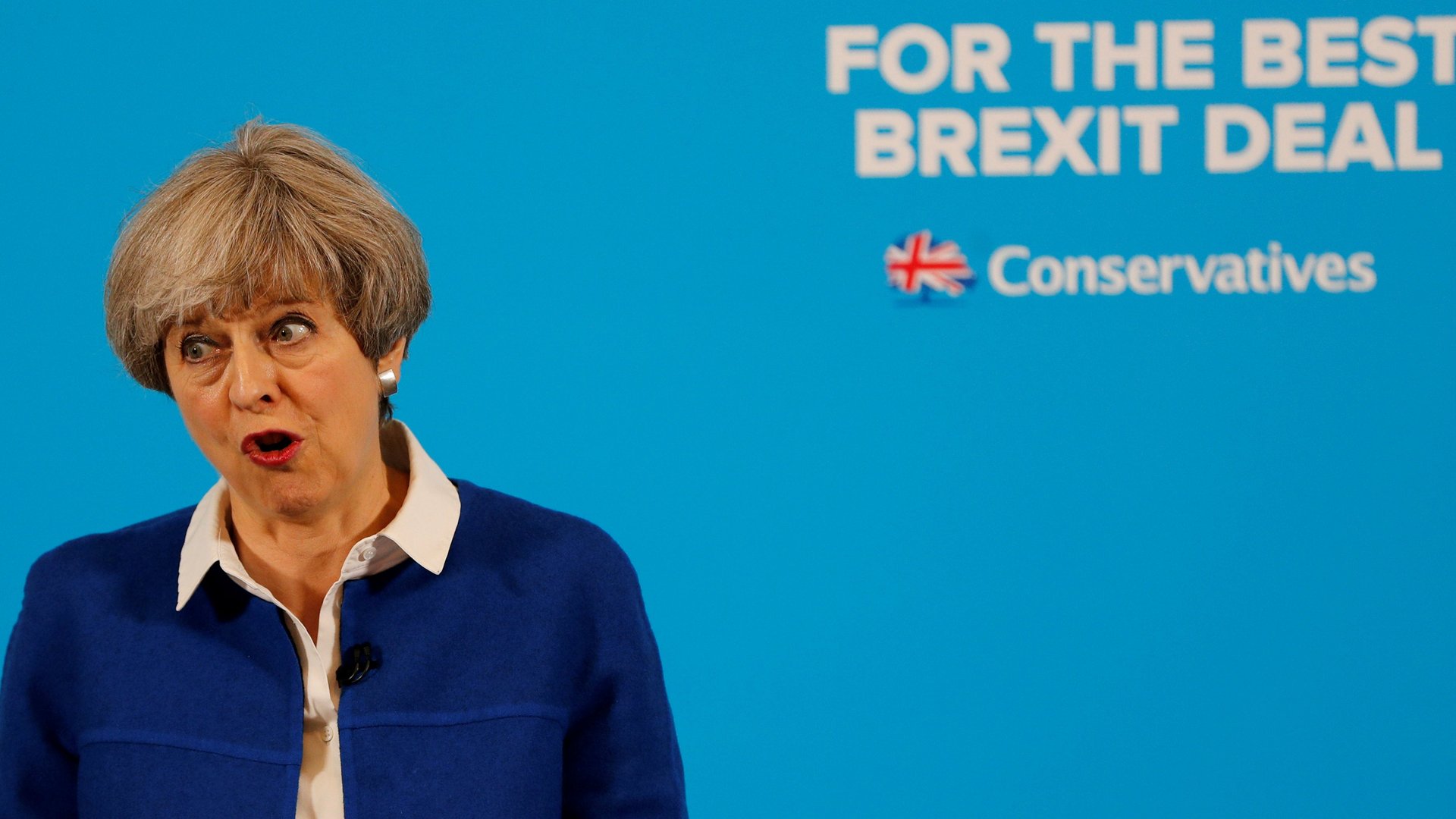The UK election is suddenly wide open and markets are totally discombobulated
British prime minister Theresa May had a plan. Catch rivals off guard by calling a “snap” general election after repeated denials that you would do such a thing. Tend to a 20-percentage-point polling lead over the Labour opposition party during a short campaign. Win big on election day, June 8, and use the thumping new mandate at home as a platform to push around the eurocrats in Brussels during the subsequent Brexit negotiations and quiet any rebels at home. Put feet up.


British prime minister Theresa May had a plan. Catch rivals off guard by calling a “snap” general election after repeated denials that you would do such a thing. Tend to a 20-percentage-point polling lead over the Labour opposition party during a short campaign. Win big on election day, June 8, and use the thumping new mandate at home as a platform to push around the eurocrats in Brussels during the subsequent Brexit negotiations and quiet any rebels at home. Put feet up.
Investors bought into the plan (paywall). When May announced the election on April 17, the pound surged to its strongest level in six months against the dollar. But now, with a week to go until the vote, it’s safe to say that things aren’t going according to plan.
The latest opinion polls show May’s Conservative party steadily losing its lead over Labour, with a poll out late yesterday showing a mere three-point margin for the Tories. Traders aren’t sure what to make of this, so the pound has been bouncing around in response to each new poll.
In terms of what the next week holds for the currency, the opinions among bank strategists are as varied as they are among voters. Here’s a selection:
A big conservative victory is good for the pound
Following the previous election, the Conservatives won a working majority of 17 seats in the 650-member House of Commons. According to comments collected by Bloomberg, strategists say May’s party needs to expand its majority to at least 100 seats for the pound to definitely rise. Anything less, however, has left strategists conflicted about whether this would lead to a rise or fall in the currency.
A less big Conservative victory isn’t so good for the pound
Some recent polls suggest that May’s majority may not grow that much, or possibly even shrink. Kathleen Brooks, research director at City Index, says a small Conservative majority is the most likely outcome of the election, and this could send the pound back down to $1.20, a 7% drop from where it currently trades. That’s a hefty plunge for a result that essentially preserves the status quo.
Polling companies have also started to convert national polls into projections of seats. One of the first of these, published on May 30 by YouGov, suggested that the Conservatives would lose their majority, leaving the UK with a hung parliament. The pound got a fright on this news—YouGov’s projections showed Labour poised to gain almost 30 seats and give them a hypothetical chance of forming a center-left coalition government with other opposition parties.
A Labour victory is bad for the pound
For most, including FxPro and RBC Global Asset Management, Labour winning the most seats next week is seen as bad for the pound. But JPMorgan aren’t so sure. Analysts at the US bank believe that a coalition of center-left parties would lead to a “soft” Brexit (preserving privileged access to the EU’s single market and not clamping down so hard on immigration), which might be better for the UK economy and its currency (paywall).
Wait, maybe a Labour-led government is good for the pound
Analysts at Nomura expect something similar. A surprise Labour win would initially weaken the pound, but if ultimately a government led by prime minister Jeremy Corbyn let up on austerity measures and negotiated a softer Brexit, the pound would eventually end up stronger.
Huh?
It’s hardly surprising that strategists aren’t in agreement, since the polls have suddenly diverged so greatly. In the past week, polls have put the Conservatives’ lead at anything from three to 15 percentage points over Labour. And on the same day that YouGov said the Tories might lose their majority in parliament, ComRes, another polling company, said the Conservatives were on track for a 100-plus majority.
The only thing for certain is that the pound is in for a bumpy ride over the next week.